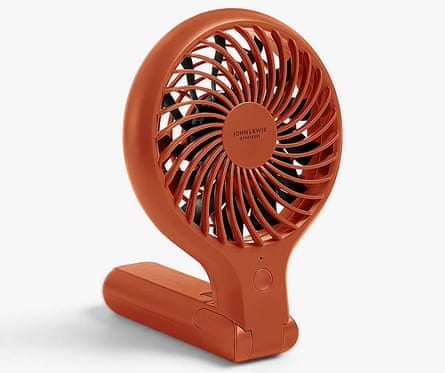
At fashion week, there is usually one accessory you begin to spot again and again among the editors and celebrities on the front row. However, during the menswear shows in Paris last week, it wasn’t a particular designer bag or shoe that kept cropping up. It was the new must-have: a mini portable fan.
From A-listers to influencers to PRs running around backstage, battery or USB-powered fans were everywhere. Demi Moore watched the Dior show with a black portable fan in hand, while the influencer Bryanboy posted a video of his own “wind machine” at Loewe.
It’s not just limited to fashion week. A John Lewis spokesperson says searches for small portable fans are up 300% week on week, describing a four-inch foldable version with three speed settings as “going viral”. Three out of its four colourways are sold out at the time of writing, and more than 300 buyers have given it a five-star rating.
The global portable fan market, meanwhile, is expected to grow 3.3% annually from now until 2030.
“It’s surprisingly effective,” says Chandler Tregaskes, Tatler’s style editor who bought a baby pink fan to use at Ascot. “I wanted to keep my cool in navy wool and millinery,” he says.
Of course, fans aren’t exactly a new phenomenon. The Fan Museum in London has over 7,000 examples spanning 1,000 years, and paintings from south-east Asia depict fans from at least the eighth century.
And while traditional handheld paper fans continue to be used (at the recent Jacquemus show in Versailles, guests including Victoria Beckham were given cream versions) it’s the rechargeable fans that have really propelled themselves to the top.
“The gesticulation of the paper fan will never die,” says Tregaskes. “It’s simultaneously coquettish and fabulous. But for a quick, easy breezy return to chic, the electric fan is where it’s at.”
However, this surge in demand for an accessory that attempts to cool the body down hints at a more worrying development. As we continue to feel the effects of climate change, soaring temperatures are becoming more prevalent with each year. In the UK alone, this June is expected to have been the hottest on record. On Sunday, temperatures in some areas reached 32.2C. Nasa, meanwhile, reported that the past nine years have been the warmest years globally since modern record-keeping began in 1880.

Last summer, Brad Pitt swapped trousers for a skirt – telling reporters he chose it because of “the breeze” – while Spain’s prime minister, Pedro Sánchez, encouraged workers to ditch ties to save energy. If temperatures continue to rise, though, it’s going to take a lot more than a portable fan and “breathable” fabric such as cotton to keep our bodies cool.
after newsletter promotion
While “sweat-wicking” fabrics have become commonplace, this type of clothing makes the wearer feel dry and in turn comfortable, but doesn’t lower their temperature. Many of these fabrics are also made from petroleum, which has a huge environmental impact.
“Heat conducts 38 times faster in dampness than in dry conditions,” says Charles Ross, a sustainability expert and lecturer at the Royal College of Art. “It’s the effect of sweating that cools the body.” As a result, textiles that actually reduce the temperature of the body – and which can also be produced in an environmentally friendly, or at least friendlier, way – are quickly going from a niche area of scientific research to the mainstream. By decreasing the temperature of the body, textiles could, researchers say, one day help reduce deaths from extreme heat.
In the US, LifeLabs, sells £38 “CoolLife” T-shirts that allow body heat to escape, creating a continuous cooling effect, while scientists in China have developed a “metafabric” which, in trials, kept the wearer 3C cooler than cotton over a 30-minute period. Both are probably much more effective than a mini fan, despite the latter’s A-list approval.
To read the complete version of this newsletter – complete with this week’s trending topics in The Measure and your wardrobe dilemmas solved – subscribe here to receive Fashion Statement in your inbox every Thursday.



